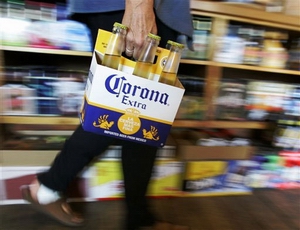 Think Pennsylvania is the only state in the midst of a fight involving the sales of liquor? Head south across the border to Maryland.
Think Pennsylvania is the only state in the midst of a fight involving the sales of liquor? Head south across the border to Maryland.Just like in Pennsylvania, shoppers want to be able to pick up a bottle of wine or a six-pack of beer in the supermarket with their cereal, milk and eggs.
In Maryland chains such as supermarkets and shoppers clubs are generally banned from selling alcohol. But some in the state would like to see that change.
“In order for there to be change in Maryland, the retail community needs to unify and decide this is a priority for them,” said Adam Borden, president of Marylanders for Better Beer & Wine Laws, a 25,000 member advocacy group.
The fight is in its early stages. Legislation was proposed by delegate Benjamin Barnes, who represents both Anne Arundel and Prince George's counties, that calls for the creation of licenses for chains.
No public hearings have been held yet. The Maryland General Assembly adjourned last week, and will not meet again until January 2014.
In Maryland about 15 chain stores – mostly supermarkets - sell wine and beer under a grandfathered clause. Maryland changed its law in 1978, and since then chains have not been permitted to apply for licenses to sell wine and beer.
But that hasn't stopped them from trying.
Last year, a license was not granted by the Howard County Alcoholic Beverage Commission to open a second floor liquor store at the Wegmans in Columbia.
The Harris Teeter supermarket in Locust Point in South Baltimore ran into a fight when some claimed the neighboring The Cellars wine and spirit store was operating in conjunction with the supermarket. The stores are required to operate with separate entrances.
Both those incidents prompted the issue to bubble up after nearly 38 years, Borden said.
As it stands, shoppers in Maryland can purchase beer, wine and spirits at privately owned liquor stores. But many consumers – much like their counterparts in Pennsylvania- say they would like to see alcohol sales expand.
In a poll sponsored last September by Marylanders for Better Beer & Wine Laws, 64 percent of registered voters polled said they would prefer being able to buy wine and beer at chain stores including supermarkets, drug and convenience stores.
The group also commissioned an economic and fiscal study. It found sales in chains would generate an initial $72 million for Maryland in licensing fees. The projected net increase in beer sales is an estimated $64.6 million and wine sales about $16.1 million for a total of $80.7 million in expanded sales volume.
Pennsylvania and Maryland are among four states in the country that don't allow beer sales in chains and 12 states that don't permit wine sales. Although, in Pennsylvania, about 150 supermarkets sell beer via restaurant licenses.
A bill to scrap Pennsylvania's more than 80-year-old liquor monopoly is now in the Senate. A hearing is scheduled for April 30 in the Senate Law and Justice Committee.
The legislation would give beer distributors first crack at 1,200 wine and spirits licenses and allow supermarkets to sell wine.
Chain stores, including Giant Food Stores and Weis Markets along with big box stores such as Target and Walmart, have indicated they want to sell beer and wine in the state. It's the same story in Maryland where Weis operates 27 stores, none of which sell alcohol, said Dennis Curtin, spokesman.
“We would be interested in selling beer and wine because we view it as a convenience option for our customers, and more importantly they view it as a convenience option and one they appreciate,” he said.
But not everyone agrees with the idea. Largely, independent stores such as Honeygo Wine and Spirits north of Baltimore in Perry Hall, say allowing chains to carry liquor would hurt business.
“It wouldn't be beneficial,” said Bernard Hoffman, owner. “We've been hearing rumblings about it for 30 years. It's getting closer. In some form or another it's probably going to happen in the next five years.”
He said permitting chains to sell would force independent stores to layoff employees who most likely would not be rehired by the supermarkets.
In addition, he said shoppers wouldn't see the quantity of products in chain stores compared to what the private stores carry. He sells 1,200 types of beer and 3,000 wine products.
“For ease and convenience the customers might have an appreciation of being able to make a purchase in the grocery store, but I don't think the grocery store is going to carry the full breadth of products we carry,” Hoffman said.





